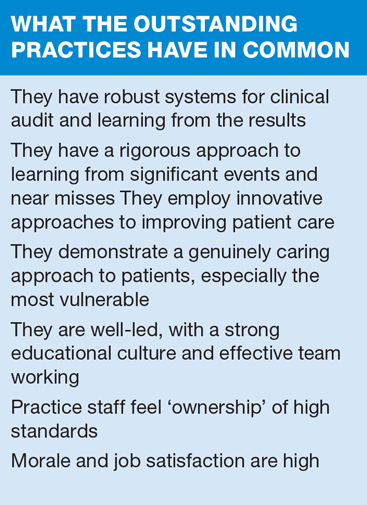
An inspector calls: What does an outstanding practice look like?
The author is a professional adviser who regularly participates in Care Quality Inspections in gener...
The author is a professional adviser who regularly participates in Care Quality Inspections in general practice
The Care Quality Commission recently published the first reports on its new-style inspections revealing outstanding general practice in two ‘very different’ practices
Two practices have recently been praised as ‘outstanding’ by the Care Quality Commission’s chief inspector of general practice, Professor Steve Fields.
Salford Health Matters, Eccles and Irlam Medical Practice, Greater Manchester, achieved the highest possible ratings following inspections in October. In both cases, the practices were rated as outstanding across the five key questions by which general practice is judged:
- Are services safe?
- Are services effective?
- Are services caring?
- Are services responsive to people’s needs?
- Are services well-led?
So what makes these two practices outstanding?
The inspection of Salford Health Matters found:
The practice is safe: Staff understand and fulfil their responsibilities to raise concerns and report incidents and near misses. All opportunities for learning from internal and external incidents are maximised to support improvement.
The practice is effective: It is using innovative and proactive methods to improve patient outcomes and links with other local providers to share best practice.
The practice is caring: feedback from patients about their care and treatment is consistently and strongly positive. There is a patient centred culture and strong evidence that staff are motivated and inspired to offer kind and compassionate care, working to overcome obstacles to achieve this. There are many positive examples to demonstrate how people’s choices and preferences are valued and acted on.
The practice is responsive to people’s needs. It implements suggestions for improvements and makes changes to the way it delivers services as a consequence of feedback directly from patients and from the patient participation group (PPG).
The practice is well-led. It has a clear vision, which has quality and safety as its top priority. A business plan is in place that is monitored and regularly reviewed by the board, and discussed with all staff. The practice is a social enterprise and has a board of directors, including a non-clinical chief executive, responsible for making business decisions. High standards are promoted and owned by all practice staff with evidence of team working across all roles.
Examples of outstanding practice include:
All patients who require an appointment with a GP are seen on the day their request is made. The practice has late night and weekend opening.
Appointment length is needs-specific so longer appointments can be offered when needed. Longer appointments are routinely offered to patients with a learning disability.
The practice as a very good skills mix, which includes advanced nurse practitioners who have more responsibility than practice nurses and see a broader range of patients. There is a preceptorship programme in place to support nurse practitioners new to the practice.
There is an excellent system in place for clinical audit, and learnings are shared within the practice and externally.
The practice takes the care of vulnerable people seriously, e.g. a GP attends a drop-in centre three times a week and all staff are ‘dementia friends’ so understand how to help patients with the condition.
The practice proactively seeks feedback from patients, including by sending text messages to patients following an appointment to ask about their satisfaction.
Communication with staff is excellent with weekly meetings away from the workplace and weekly emails from the chief executive Neil Turton to keep them informed.
Mr Turton said: ‘We are delighted and proud of this achievement – for our company, staff and the people we serve.
‘This is recognition of the seven years of hard work we have put in as a brand new social enterprise to improve the quality of primary care for the people we serve.
‘We have achieved this through by having a fantastic team of well-trained and motivated staff, good strong leadership, and a commitment to quality, excellence and continuous improvement – when things don’t go right, we learn, fix them, and improve.
‘We are particularly proud that we are a social enterprise, with a focus on good quality patient care, not profits. We have created a special place to work that harnesses all our talents, given us a shared purpose and a common set of values.’
The inspection of Irlam Medical Practice found:
The practice is safe: There are systems in place to address incidents, deal with complaints and protect adults, children and vulnerable people who use the service. Significant events are recorded and shared with multi-professional agencies and there is evidence that lessons are learned and systems changed so that patient care is improved.
The practice is effective: There are systems in place to support the GPs and other clinical staff to improve clinical outcomes for patients. QOF data shows that outcomes for the practice’s patients are above average for the local area. Patient care is in line with best practice national guidelines.
The practice is caring: It is pro-active in obtaining as much information about patients including carer status, family dynamics, dependency and any factors that might affect their health and wellbeing. All the staff know the patients well, are able to identify those in crisis and are professional and respectful when providing care and treatment.
The practice is responsive: It plans services to meet the diversity of patient needs. There are good facilities and the appointment system provides good access to the service.
The practice is well led: It has a clear vision and set of values, which are understood by staff and communicated to patients. There is a clear leadership structure in place, quality and performance are monitored and risks are identified and managed.
Examples of outstanding practice include:
Practice staff proactively follow up information received about vulnerable patients. The inspectors saw five examples where clinical and reception staff used their initiative to raise a concern, leading to a positive outcome for the patient.
The practice reaches out to the local community: the practice nurses have voluntarily carried out an annual stroke awareness clinical at a local supermarket for the past five years.
Clinical audit is undertaken regularly, and the results used to improve the quality of services. Significant events are recorded and shared inside and outside the practice. The inspectors saw evidence that lessons were learned and systems changed to improve patient care.
There is good leadership and a strong learning culture. Staff are encouraged to propose suggestions for improvement, with a high level of constructive staff engagement and staff satisfaction.
Contacted by Practice Nurse, outgoing Practice Nurse Association chair Tina Bishop commented: ‘We know there are excellent practices out there, it’s great that we can now celebrate them.
‘Both practices demonstrate reaching out to their local community in meaningful ways and they both also have a team approach to caring for vulnerable people.
‘It’s interesting that the Salford Practice is a social enterprise and all staff are employed. Their skill mix has enabled them to respond to the needs of the population. Perhaps this is a model worth looking at for other practices.’
